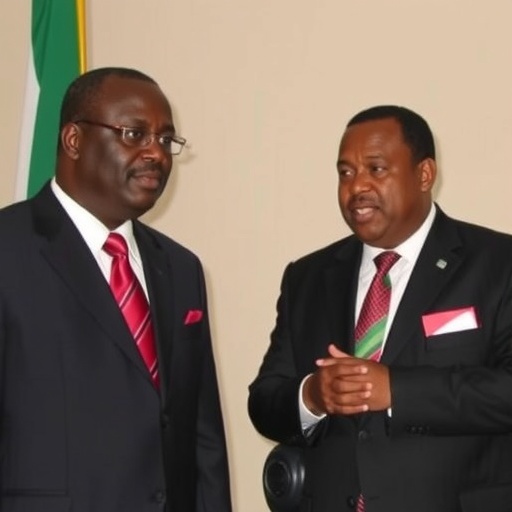In Togo, a nation rich in culture and diversity, the dynamics of governance have been under intense scrutiny, particularly as it relates to the decentralization of municipal authority. The complexities of this subject reflect the pressing need for understanding how local elected officials perceive the mechanisms of decentralization and its financial underpinnings. A recent study sheds light on these perceptions, analyzing the potential benefits and challenges faced by municipal leaders in Togo as they navigate the waters of decentralized governance.
Decentralization in Togo is a multifaceted issue that involves rethinking the distribution of power and resources from central government authorities to local municipalities. This shift aims to enhance democratic governance, making local authorities more accountable and responsive to the needs of their communities. For many municipal officials, decentralization is not merely a theoretical concept but a practical tool that can significantly affect their operational capabilities. However, the experiences of these officials reveal a diverse range of opinions about the effectiveness and efficiency of the current decentralization framework.
The significance of this study cannot be understated, as it provides a critical analysis of municipal officials’ perceptions in the context of Togo’s ongoing efforts to decentralize governance. Among the various factors examined, the study highlights the importance of financial resources in determining the success of decentralization initiatives. Municipal officials voiced concerns regarding inadequate funding and resources, which can hinder their ability to implement decentralized governance effectively. This financial strain not only affects their operational capacity but also poses challenges in addressing the developmental needs of their constituencies.
Moreover, the research underscores the varying degrees of understanding and acceptance of decentralization among municipal leaders. While some officials embrace the concept as an opportunity for empowerment and local development, others remain skeptical. Their skepticism often stems from a lack of clarity regarding the responsibilities transferred from the central government and ambiguity about their financial autonomy. This disparity in perceptions can lead to inconsistent approaches to local governance, which consequently affects service delivery and community engagement.
The impact of historical context also plays a crucial role in shaping perceptions of decentralization in Togo. The legacy of centralized governance, coupled with a history of political instability, has left an indelible mark on the mindset of local leaders. Many officials contend with inherited structures that are slow to evolve, making it challenging to fully embrace the principles of decentralization. This historical backdrop vividly illustrates the need for renewed dialogue and education on the importance of decentralization, fostering a culture of local governance that encourages participatory democracy.
Through extensive interviews and surveys, the study captures the voices of municipal leaders, shedding light on their daily experiences and realities under the current system. Their insights reveal a sense of urgency for more structured support from the central government, particularly in terms of training and resources to enhance local capacities. This desire for support reflects a collective understanding that successful decentralization requires not only a shift in authority but also a comprehensive framework for capacity building.
Furthermore, the findings indicate that effective communication and collaboration between various levels of government is essential for successful decentralization. Municipal officials express the need for more robust frameworks that facilitate meaningful dialogue with central authorities, enabling them to voice their needs and concerns. Such communication can bridge the existing gap between the national and local governments, fostering a more cooperative atmosphere that enhances governance effectiveness.
However, the debate surrounding decentralization is far from one-dimensional. While many agree on its potential benefits, the challenges associated with uneven power distribution, resource allocation, and political will cannot be overlooked. The study highlights the need to address these challenges head-on to ensure that decentralization does not exacerbate existing inequalities or create new power dynamics that disadvantage certain municipalities over others.
In conclusion, the research on the perceptions of municipal elected officials in Togo paints a complex picture of decentralization. It is evident that while opportunities exist for local empowerment and development, significant barriers remain. The interplay between finance, historical context, and governance structures shapes how decentralization is perceived and implemented across the nation. Moving forward, fostering open dialogue, building capacity, and addressing financial concerns will be crucial in realizing the full potential of decentralization in Togo.
The findings of this study offer a significant contribution to discussions on decentralization in developing countries. They emphasize the importance of nuanced understandings of local governance dynamics and the need for adaptive strategies that reflect the unique contexts of individual municipalities. As Togo continues to grapple with its decentralization efforts, the insights gleaned from this research could serve as invaluable guidance for future policy-making, promoting sustainable development and enhanced local governance.
Ultimately, Togo’s journey toward effective decentralization is a reflection of broader trends in governance worldwide, where local leadership is increasingly recognized as pivotal to sustainable development. As municipalities aspire to navigate their own destinies, the experiences and perceptions of elected officials will undoubtedly play a central role in shaping the future of governance in Togo.
Subject of Research: Municipal elected officials’ perceptions of decentralization and its financing in Togo
Article Title: Municipal elected officials’ perceptions of decentralization and its financing in Togo
Article References: Pali, E., Aholou, C.C. & Yatta, F.P. Municipal elected officials’ perceptions of decentralization and its financing in Togo. Discov Sustain 6, 931 (2025). https://doi.org/10.1007/s43621-025-01877-4
Image Credits: AI Generated
DOI: 10.1007/s43621-025-01877-4
Keywords: Decentralization, Municipal Governance, Local Authority, Togo, Elected Officials, Governance Challenges, Community Development, Financial Autonomy.




